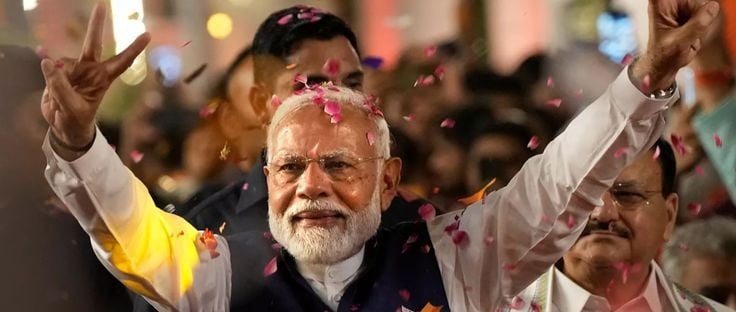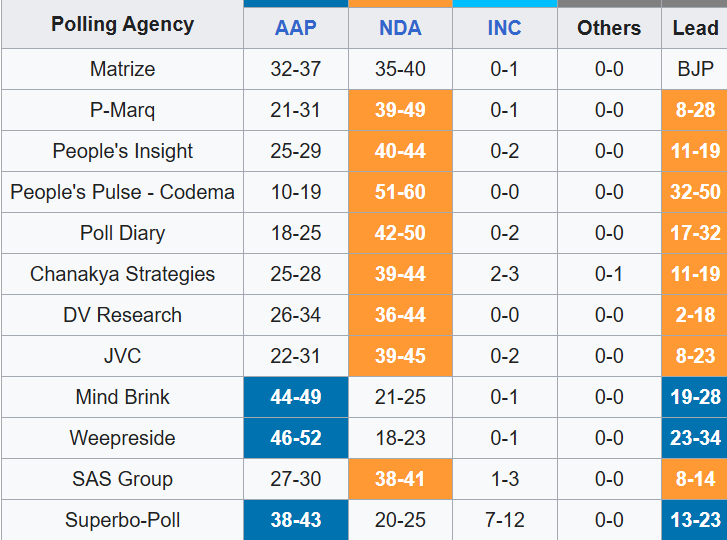Delhi Election 2025: BJP Set for Landslide as AAP Falters, Congress Struggles
These projections consistently indicate a majority for the BJP, with seat estimates ranging from 35 to 60. The AAP is projected to secure between 10 to 52 seats, while the Congress is anticipated to have a minimal presence, with seat counts varying from 0 to 12.
POLITICS
2/6/20253 min read


As the political landscape of Delhi braces for the official election results, a significant number of exit polls forecast a triumphant return to power for the Bharatiya Janata Party (BJP). This anticipated shift underscores the electorate's desire for a change from the decade-long governance of the Aam Aadmi Party (AAP).
Exit Poll Projections by Agency
A comprehensive analysis of various exit polls reveals the following seat projections for the 70-member Delhi Legislative Assembly:
Source: 2025 Delhi Legislative Assembly election - Wikipedia
These projections consistently indicate a majority for the BJP, with seat estimates ranging from 35 to 60. The AAP is projected to secure between 10 to 52 seats, while the Congress is anticipated to have a minimal presence, with seat counts varying from 0 to 12.
Critique of AAP and Congress: The Consequences of Populist Policies and Unmet Promises
The projected decline in support for both AAP and Congress can be attributed to their persistent reliance on populist measures and a history of unfulfilled promises.
The AAP, under the leadership of Arvind Kejriwal, has implemented a series of populist initiatives, including free electricity, water, and bus rides for women. While these measures were initially well-received, they have raised concerns regarding fiscal sustainability and the neglect of essential infrastructure development. Critics argue that such policies prioritize short-term gains over long-term progress, potentially compromising the city's future growth and stability.
Moreover, the AAP's tenure has been marred by allegations of corruption. Notably, Arvind Kejriwal was arrested on graft charges weeks before the general election, a move he claimed was politically motivated. Although he was later released on bail, such incidents have cast a shadow over the party's commitment to clean governance.
The Congress party, on the other hand, has struggled to present a compelling alternative to the electorate. Internal critiques have highlighted the party's shortcomings in governance and its disconnect with voter aspirations. This disconnect has been reflected in their diminishing support base, as evidenced by their projected minimal seat count in the exit polls.
The Future of Delhi Under BJP: A Vision for Development and Governance
With the exit polls strongly indicating a return of the Bharatiya Janata Party (BJP) to power in Delhi, the capital is set for a significant shift in governance. The AAP-led administration, which dominated the city for the past decade, is expected to be replaced by a government that aligns closely with Prime Minister Narendra Modi's vision of a "Viksit Bharat" (Developed India). This transition brings expectations of better governance, economic stability, and infrastructural growth while curbing the unsustainable freebie culture promoted by AAP and Congress.
Breaking Free from AAP's Populist Freebie Culture
AAP's governance relied heavily on providing free electricity, water, and bus rides at the cost of Delhi’s economic stability. While these schemes may appear attractive, they have led to:
Budget deficits, limiting funds for infrastructure and health.
Over-reliance on subsidies, discouraging self-sufficiency among citizens.
Deterioration in essential services, as witnessed in the declining quality of roads, hospitals, and civic services.
BJP’s approach, on the other hand, focuses on "empowerment over entitlement." Instead of giving short-term free benefits, the party will work towards creating an economically self-sufficient Delhi where people have jobs, business opportunities, and better civic amenities rather than relying on government handouts.
Conclusion: A New Chapter for Delhi?
If BJP wins the upcoming Delhi election, it marks the end of AAP’s populist era and the beginning of a development-driven administration. With a strong focus on law and order, economic reforms, and infrastructure, BJP is poised to transform Delhi into a world-class capital city that prioritizes growth, sustainability, and accountable governance over hollow promises and mismanagement.
The people of Delhi now have a choice: continue with a stagnant, freebie-driven model or embrace a governance model that fosters real development and prosperity.

